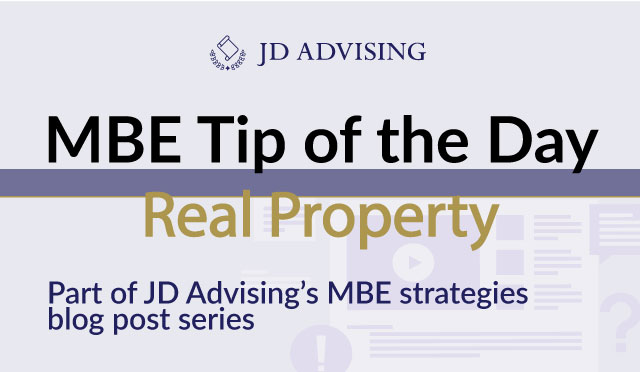Real Property MBE Tip of the Day
Real Property MBE Tip of the Day
Welcome to our MBE tip of the day series. This “MBE tip of the day” post focuses on Real Property MBE questions.
You will see 25 scored real property MBE questions on the Multistate Bar Exam. In this post, we will review a real property question together. Note that we have posted several MBE tips (which you can find links to at the bottom of this post) that focus on a specific multiple-choice question that many students answer incorrectly. If you can master these questions, it could increase your MBE score by that many points if you see any of these issues tested again (which, by the way, you will!). These posts of MBE tips and tricks will not only cover substantive law but also strategy. So each “MBE tip of the day” post covers one highly-tested area of substantive law as well as an important MBE strategy. You can sign up to receive these posts directly to your inbox for the upcoming administration at the bottom of this page.
Real Property MBE Tip of the Day
MBE Tip of the Day Instructions:
Do your best to answer this real property MBE question (before even looking at the answer choices and before looking at the answer below!) Ask yourself: What is the subject? Next, what is the legal issue? What is the rule and analysis? Finally, what is the conclusion? Try to answer these beginning questions before even reading the answer choices. Then, uncover the answer as well as read more about our MBE tip of the day.
Show the MBE Question...
Real Property MBE Question
A man and a woman own neighboring pieces of land. The man wants to build an in-ground pool in his backyard. Fearing that if not properly maintained the pool could cause damage to her yard and attract unwanted plants and animals, the woman makes the man promise to have the pool cleaned and maintained by someone qualified once every two weeks while in use. This promise was reduced in writing and contained the following clause: “It is our intent that this agreement will bind our successors unless an agreement is reached between the owners at that time.” The man and the woman had this written agreement added into the deeds of both pieces of property.
One year later, the man granted his land to his son and the woman granted her land to her daughter. There were no discussions about the pool maintenance promise. Two months later, the daughter noticed that the pool was in disrepair as no one had cleaned it since the son moved in, although he had been using it. The daughter filed for an injunction demanding that the son resume cleaning his pool.
Who will prevail?
(A) The son, because there was no horizontal privity between the man and the woman.
(B) The son, because there was no horizontal privity between the son and the daughter.
(C) The daughter, because she is an original party to the contract and can enforce it against the other original party or any party in privity.
(D) The daughter, because she sought an injunction.
Subject:
Legal Issue:
Legal Rule and Analysis:
Choose an answer choice that most closely matches your conclusion and explain why the others are incorrect:
Show the Answer to the MBE Question...
Answer to the Real Property MBE Question
Subject: Real Property
Legal Issue: Real Covenants vs. Equitable Servitudes
Legal Rule and Analysis: Both a covenant and a servitude restrict how an owner can use his land. They consist of written promises to do or to refrain from doing something on the land. The difference between a covenant and a servitude is the remedy sought. If the plaintiff wants money damages, he will sue under a theory of breach of a real covenant. If the plaintiff wants something like an injunction that forces the other party to comply, he will sue in equity under a theory of equitable servitude.
Both covenants and equitable servitudes can run with the land if the land is transferred. If the legal theory is a covenant, for the burden to run, we need both vertical and horizontal privity, intent, notice, and the condition must touch and concern the land. For the benefit of a covenant to run, we need all of these requirements except for horizontal privity. For an equitable servitude to run with the land, we only need intent, notice, and touch and concern.
In this case, the daughter is seeking an injunction forcing the son to clean his pool, making this an equitable servitude situation. Since the son is a grantee of the property, for the son to be held to the promise between the man and the woman, we need intent, notice, and touch and concern elements. We clearly have intent as the facts tell us about a specific written clause in the agreement explicitly stating their intent for the promise to run. We also have notice as the promise was contained in the deed. This constitutes proper record notice. The requirement of properly maintaining the pool certainly touches and concerns the land as it makes the pool more useful, usable, and valuable. Thus, all of the requirements are met and the equitable servitude will run with the land.
Conclusion: Since the daughter is seeking an injunction, this makes the promise an equitable servitude and the daughter is likely to prevail as all of the requirements for running with the land are met.
Look at the answer choices provided. Choose an answer choice that matches your conclusion. Review the other answer choices provided. The answer choice (D) is therefore correct. (A) is incorrect because, while it is true that there is no horizontal privity between the man and the woman (a mere neighbor contractual relationship does not suffice), horizontal privity is not required for an equitable servitude to run with the land. (B) is incorrect because, as just stated, horizontal privity is not required. Even if it was, we would need horizontal privity between the man and the woman and not between the son and the daughter. (C) is incorrect because it does not recognize the elements of an equitable servitude that are needed. Just because the woman is an original party to the contract does not mean she can enforce it against the other original party or any party in privity. The woman would have to show that all of the requirements of an equitable injunction were met in order to enforce the contract.
MBE Tip: Always look for the differences when concepts seem too similar on their face. The difference between covenants and equitable servitudes is a tricky topic because it all just sounds like a promise to do or not to do something. But why would we devote too much time and energy to two concepts that are identical, just with different names?! There has to be a difference somewhere, and finding it will be the key to understanding this topic. With these two concepts, the key is to look at the remedy being sought. If it is money, you should look to the rules for covenants. If it is an injunction, you should look to the rules for equitable servitudes. Therefore, if you can spot the differences between topics that seem similar to you, you’ll have a better chance at remembering them and properly identifying them on the exam!
Show Summary of the Two Key Takeaway Points for the Day
Key Takeaways and MBE Tips From Prior Posts
Takeaway for the Law: Equitable servitudes involve seeking an injunction instead of money damages and do not require privity to run with the land.
MBE Tip: Always look for the differences when concepts seem too similar on their face!
Want to See Past MBE Tip of the Day Posts?
If you would like to see “MBE tip of the day” posts from prior days, please check out all of our past MBE tip of the day archives here! We have several of them and we list them by subject!
Looking for additional MBE help?
If you are looking for MBE help, read our 10 expert MBE tips here. Check out our step-by-step guide to improving your MBE score, please review this post for an overview of tips. If you would like to have the next MBE tip emailed to you when we come out with another one, please fill out the form below.
MBE Tip of the Day
Seeking MBE Assistance?
Seeking MBE Assistance?
- 📘 MBE Guide: Equip yourself with our FREE expert-crafted bar exam and MBE guides.
- Free Bar Exam Resource Center: Discover top resources, articles, and free webinars led by renowned bar exam professionals.
Top Resources as Vouched by our Students:
- MBE One-Sheets: One of our most highly acclaimed bar exam supplements!
- Bar Exam Outlines: Our comprehensive and condensed bar exam outlines present key information in an organized, easy-to-digest layout.
- MBE Private Tutoring: Opt for personalized, effective strategies.
- On Demand Bar Exam Course: Comprehensive bar exam preparation.
- Bar Exam Crash Course and Mini Outlines: Acclaimed and effective for a quick refresher.
- MBE Mastery Class, Real MBE Questions, and MBE Guide: Elevate your MBE preparation with these high-quality MBE supplements!
🔥 NEW! Check out our Repeat Taker Bar Exam Course and get introduced to our unmatched platinum Guarantee Pass Program.






Leave a Reply
Want to join the discussion?Feel free to contribute!